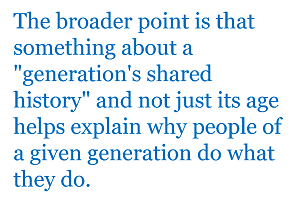What's Old Is New Again: Revisiting Our Thinking On Generational Marketing
 What do Baby Boomers, Gen Xers, Millennials and Gen Z have in common? Much, much more than marketers would want to believe. While each of these generations has been (and continues to be) feverishly courted by companies and brands, generational marketing rarely takes advantage of the marketing opportunities posed by a unique cohort of consumers. Marketing strategies based on age or other artifacts (income, gender, geography, etc.) that masquerade as demographic markers is not the point. The practice of pitching to an entire generation as if it were a sensible target doesn’t make sense. This is the fundamental problem with generational marketing.
What do Baby Boomers, Gen Xers, Millennials and Gen Z have in common? Much, much more than marketers would want to believe. While each of these generations has been (and continues to be) feverishly courted by companies and brands, generational marketing rarely takes advantage of the marketing opportunities posed by a unique cohort of consumers. Marketing strategies based on age or other artifacts (income, gender, geography, etc.) that masquerade as demographic markers is not the point. The practice of pitching to an entire generation as if it were a sensible target doesn’t make sense. This is the fundamental problem with generational marketing.
In practice, generational marketing often amounts to little more than an undisciplined hash of age- and period/event-driven marketing rather than a well-considered appeal to the unique tastes and sensibilities of a whole cohort. That is, when marketers talk about a generation of consumers, they frequently speak of how consumers at a particular life stage respond to key events. Strictly speaking, this is not generational marketing because neither life stage nor the experience of events is unique to any one generation. Yet even pure generational marketing is delusional if it assumes a generation will be homogeneous in outlook or behavior.
At the risk of some oversimplification, one could argue that popular notions of generations and generational marketing in particular coincided with the Baby Boom generation, which was itself derivative of academic research into the explosion in birthrates following WWII. In other words, the so-called Baby Boom generation does not constitute a generation in any meaningful marketing sense, but is simply shorthand for those born during a period of extraordinarily high fertility.
While demographers and other social scientists were off trying to understand the behavior of the parents who spawned the Boomers, businesses and marketers readied themselves for the tidal wave of new consumers about to hit the beach. So, what started out as a rational attempt to capitalize on a sure thing (it wasn't difficult to predict that sales of diapers, for instance, were about to take off, followed by beanies, roller skates and, eventually, BMWs) quickly gave way to a growth industry of consumer trend spotters and "generational marketers."
Not content to stick with the Boomers, researchers naturally began to think about all the consumers they overlooked in their zeal to capture the post-war-baby-craze generation. Might not these other consumers form generations too?
Unfortunately, without something as quantifiable as birthrates to go on, marketers and generation watchers haven't been able to agree on the stop and start dates for subsequent generations. As for the pre-Boomers, well, they're typically all lumped together and treated as one (Great) generation. More to the point, if there's something to generational marketing, then consumers born in 1964 should have more in common with consumers born in 1965 than with those born in 1946, yet we market to the first batch as Boomers and the second as Gen Xers. All this is to say the custom of generational marketing usually relies less on actual consumption patterns than on wishful thinking.
 Proponents of generational marketing claim, "Each generation's shared history gives it a sense of context from which it tends to view the world and which becomes enormously significant in understanding it." As tautological statements go, that is a good one, but the broader point is that something about a "generation's shared history" and not just its age helps explain why people of a given generation do what they do. The problem is that after the age of, say, ten there's precious little shared history to bind an entire generation, however defined, together.
Proponents of generational marketing claim, "Each generation's shared history gives it a sense of context from which it tends to view the world and which becomes enormously significant in understanding it." As tautological statements go, that is a good one, but the broader point is that something about a "generation's shared history" and not just its age helps explain why people of a given generation do what they do. The problem is that after the age of, say, ten there's precious little shared history to bind an entire generation, however defined, together.
Some people are born into wealth and others into poverty. Some people are part of a racial minority and others not. Some people live their entire lives in one small town, and others move from city to city. Some are more conservative or liberal than others, while for others politics just isn’t their thing. Perhaps when men were giants you could treat everyone born during an arbitrary expanse of time as one, but those days are long gone now. Increases in geographical and social mobility, not to mention the dawning of the Information Age, have all contributed to an expansion in the range of experiences lived by individuals, and generational marketing can't hope to speak to these varied experiences with a single voice.
The marketing community continually strives to be as relevant as possible to the subject of its messaging. With the growing effectiveness of highly targeted marketing tools developed from the mass of data collected on consumers everywhere and delivered ever more precisely to them at just the right moment, it strikes us as a bit out of step to build any kind of marketing campaign around any consumer target as large and heterogeneous as an entire generation.
This original article first appeared in January 2004, it has been updated for this publication in 2015.
